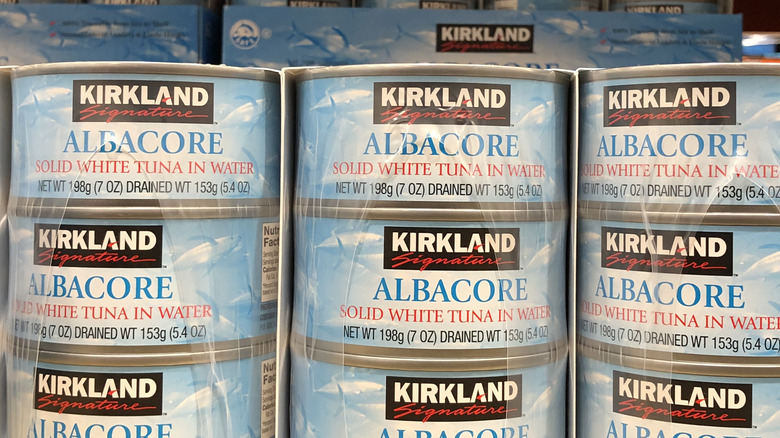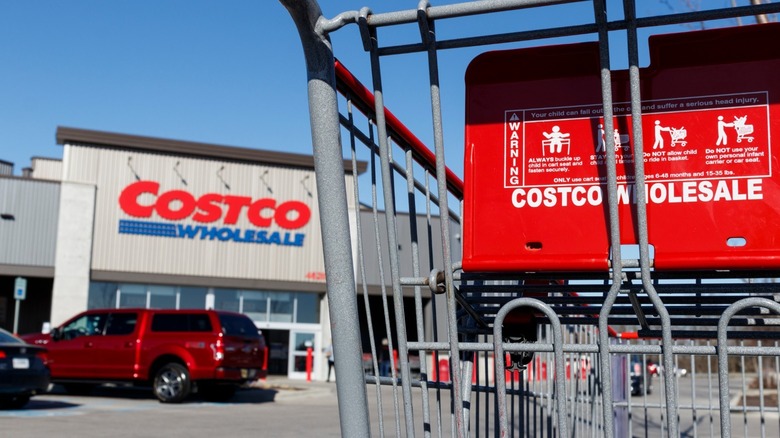Why Costco Is Being Sued Over Its Kirkland Signature Tuna
Costco has come a long way since its inception in 1976 on Morena Boulevard in San Diego. The wholesale warehouse store is at the top of its game with $222.7 billion in sales in 2022 and an impressive 92.6% membership renewal rate in the United States and Canada, per Yahoo Finance. If that doesn't speak volumes about how much people love Costco, we don't know what will.
Members paying $60 for Costco's Gold Star Membership know that they will get the bang for their buck, and it's the main reason why the wholesale giant has a cult-like following. Regular shoppers generally save more money than they spend on the membership, and the only downside seems to be that once they get in, they end up spending money on things they don't really need. "As a guy living in my own place, I have to stop myself buying 5kg of sweets or 30 packs of waffles lol," a Redditor wrote in the past.
What's more, positive Glassdoor reviews help explain why Costco has such a low turnover rate. One Redditor opined, "Costco's commitment to paying their workers a reasonable wage is my #1 reason for shopping there. (Their selection is also good)."
Costco evidently knows how to keep its customers and employees happy, but like any big business, it's far from perfect. Amid the sheer volume of goods it sells, ranging from greenhouses to good ol' toilet paper, are products that sometimes get the chain in trouble. This time, the company is finding itself in deep water over its canned tuna.
Costco accused of false advertisement and consumer laws violations
The tuna in question is Costco's Kirkland Signature Solid White Albacore Tuna in Water. The warehouse club sells it in a pack of eight 7-ounce cans, and as its website confirms, the tuna is labeled "dolphin safe." Therein lies the problem, at least according to a customer who wants to drag Costco to court over the allegedly false label.
The dolphin-safe label is not some gimmicky advertisement that tuna brands print on their cans. According to NOAA Fisheries, the Dolphin Protection Consumer Information Act has regulations in place to ensure that dolphins and other marine mammals aren't harmed or killed in the course of tuna fishing. The dolphin-safe label on tuna cans indicates that the brand complies with the set regulations and practices for safe tuna fishing.
California-based customer Melinda Wright recently sued Costco, alleging that the Kirkland tuna fails to abide by dolphin safety regulations, per Reuters. She alleged that the product violates state consumer protection laws since the white albacore tuna is reportedly caught using monofilament leader and circle hooks that pose a safety risk for dolphins. Costco initially dismissed the accusation, but U.S. District Judge William H. Orrick rejected the company's request, allowing Wright to move forward with the lawsuit that also accuses Costco of false advertisement, breach of express and implied warranty, and unjust enrichment.
Costco was further accused of "knowingly and intentionally" advertising its tuna as dolphin-safe to "increase profits at the expense of sustainability concerned consumers and innocent marine life." The court document reveals that Bumble Bee Foods, which uses potentially dolphin-harming longline fishing techniques to catch tuna, is the tuna supplier for Kirkland.
Costco is no stranger to such lawsuits
Costco isn't new to scandals and legal troubles for its seafood items. In 2015, The Guardian reported that three California law firms hit the retail company with a lawsuit alleging that it sold prawns from Thai seafood supplier CP Foods, which has a history of buying supplies "from ships manned by slaves." Costco pledged to address the issue and offered to give a refund to customers who wished to return their products.
While we're on the subject of fish and marine life, let's not forget about the time last spring when a family sued Costco for $200,000 after they ate worm-infested Kirkland Fresh Wild Pacific Halibut Fillet, per ABC 7. A pair of Southern California parents allegedly bought the product from their local Costco and cooked it the same day, when their teenage daughter discovered live worms crawling out of her fillet.
Costco's seafood isn't the only product category that has caused controversies. The chain's famous $5 rotisserie chicken has a huge fanbase, but in June of last year, two shareholders sued the retailer for raising its chickens in questionable conditions. According to the lawsuit, the company's directors deliberately turned a blind eye to the unlawful production practices, adding, "Costco's illegal neglect and abandonment is an integral part of the company's poultry production strategy." As CNN reported, Costco maintained that it hadn't breached the standards set by the National Chicken Council.


